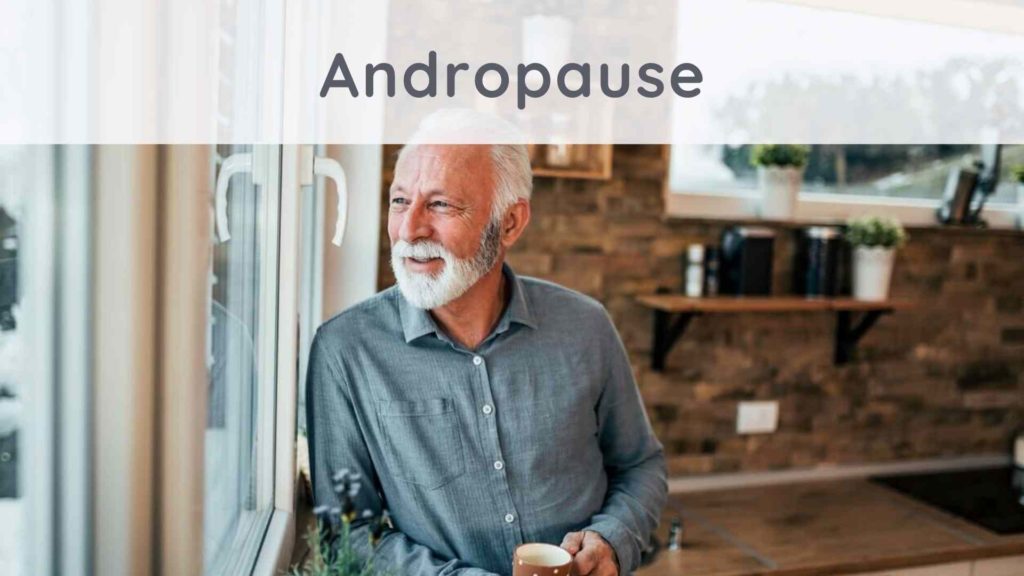Andropause : how to fight against aging?
Written by: Loris Vitry (holistic coach)
Validated by: Cathy Maillot (Osteopath)
Caution: If you have any medical questions or concerns, please speak to your doctor. Even if the articles on this site are based on scientific studies, they do not replace professional medical advice, diagnosis or treatment.

Often compared to menopause in women, andropause is a biological phenomenon that affects some adult men.
The people concerned generally have between 45 and 65 years old.
But, there may be cases of early andropause.
Although little recognized on the medical level, andropause is often subject to several debates.
How do you define andropause?
What are the symptoms?
How to delay aging linked to andropause?
Read everything in our article.
Definition of andropause
Andropause is defined as a set of physiological symptoms relating to a considerable drop in the level of testosterone in the blood.
This secretory insufficiency can have several consequences on the erection and the life of a man.
Indeed, testosterone is a crucial hormone in sexual health.
Testosterone is useful for the well-being and health of women and men in particular.
It is recognized as the libido hormone in men and acts on mood and reduces stress.
Andropause or “age-related androgen deficiency” (DALA) affects only a minority of men.
In other words, it does not affect all men, as menopause affects women.
Unlike menopause, reproduction is possible in andropause.
In other words, the production of sperm is not limited or absent.
While menopause is irreversible in women, men can regain all their sexual skills after treatment.
What are the causes of andropause?
Andropause is caused by a reduction in testosterone levels, but also by several other factors such as:
- chronic stress;
- high cholesterol;
- alcohol and tobacco;
- poor diet;
- the decrease in Leydig cells (cells present in the testes);
- decrease in the number of testosterone receptors, etc.
Even if it affects only a minority, andropause exists and presents several symptoms.
Symptoms of andropause
According to some researchers, the manifestations of andropause often resemble the signs of healthy aging.
It is, therefore, difficult to separate the symptoms of andropause from the signs of regular advancement in age.
However, some unusual symptoms can be real symptoms of andropause.
These symptoms vary from man to man, and here is a list:
Sexual dysfunction.
Sexual dysfunction can be erectile dysfunction or a decrease in sexual desire (libido).
Indeed, a man with andropause loses his sexual appetite. His erections become rare and less rigid.
His testosterone levels drop considerably.
The total level of testosterone is less than 11 nmol / L or 3 ng / mL.
In some cases, bioavailable testosterone is less than 2.5 nmol / L, or 0.7 ng / mL.
It will, therefore, be noted that the levels of bioavailable testosterone are lower than average.
Physiological disorders.
A man with andropause undergoes a change in body composition followed by hot flashes, physical asthenia, sleep disturbances, obesity, and a decrease in hair growth.
Increased visceral fat and night sweats may also be symptoms.
There is also a decrease in muscle mass and weakening of the bones, and this last symptom increases the risk of fractures.
On the other hand, urinary disorders are sometimes signs of andropause.
Psychological trouble.
Andropause can manifest itself through several mental disorders such as extreme irritability, depression.
It can also manifest as a lack of concentration and memory problems.
Also, a patient suffering from andropause can develop a lack of self-confidence, a lack of concentration, and mental weakness.
All these symptoms can be an obstacle in the active life of men suffering from andropause.
How is an andropause diagnosed?
The diagnosis of the age-related deficit is still controversial.
For some doctors, the symptoms of andropause are misleading and are interpreted as regular signs of aging.
Others, however, can detect this particular condition.
Thus, after questioning the patient, a blood test is required to confirm or refute the hypothesis of andropause.
How to fight against aging linked to andropause?
The recognition of andropause as a deficit is not unanimous in the medical profession and scientifically.
However, there are clinical and natural treatments to combat this phenomenon.
Clinical treatment of andropause: testosterone-based treatment
Hormone therapy is often necessary to delay aging-related to andropause,
This treatment can be prescribed in several forms: capsules, injection, body gels, etc.
In other words, the patient will receive testosterone intakes to fill the secretory insufficiencies.
But, before any prescription, it is recommended to eliminate any kind of contraindication likely to amplify specific ailments.
Contraindications
Hormonal treatments are contraindicated in several cases, like:
- prostate cancer,
- benign enlarged prostate
- kidney failure
- heart failure
- Liver failure.
A testosterone intake can worsen the cases mentioned above.
Natural treatment for andropause
It would be possible to heal naturally in case of andropause.
To do this, you must adopt an adequate lifestyle and favor a healthy and balanced diet.
- Avoid stress (one of the causes of andropause)
- Practice physical activity regularly
- Reduce sugar consumption
- Limit the consumption of refined products
- Avoid excessive alcohol consumption
- Limit tobacco use
- Avoid weight gain
- Control and reduce cholesterol levels in the body.
Andropause: what to remember?
Age-related deficit or andropause makes many changes in the daily lives of men.
It creates erectile dysfunction and can have severe physical and psychological consequences on men.
Andropause mostly occurs between 45 and 65 years old, and its symptoms can vary from one person to another.
But early andropause can be diagnosed even in a 20-year-old.
A healthy lifestyle is recommended to avoid any risk of andropause,
Besides, in the event of andropause, hormonal treatments are advised.
These are not suitable for people with prostate cancer.
In reality, hormone therapy does not cause prostate cancer but can be an amplifier of the disease.
In all cases, it is best to consult a doctor for better management.
Continue reading:
Anorexia : how to get your appetite back ?

